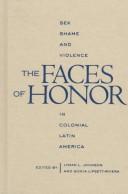| Listing 1 - 4 of 4 |
Sort by
|
Book
ISBN: 9786613664501 1280687568 0803240333 9780803240339 9780803238336 0803238339 Year: 2012 Publisher: Lincoln University of Nebraska Press
Abstract | Keywords | Export | Availability | Bookmark
 Loading...
Loading...Choose an application
- Reference Manager
- EndNote
- RefWorks (Direct export to RefWorks)
History is not just about great personalities, wars, and revolutions; it is also about the subtle aspects of more ordinary matters. On a day-to-day basis the aspects of life that most preoccupied people in late eighteenth- through mid nineteenth-century Mexico were not the political machinations of generals or politicians but whether they themselves could make a living, whether others accorded them the respect they deserved, whether they were safe from an abusive husband, whether their wives and children would obey them-in short, the minutiae of daily life. Sonya Lipsett-Ri
Human body --- Space --- Sex role --- Metaphysics --- Social aspects --- Mexico --- Anáhuac --- Estados Unidos Mexicanos --- Maxico --- Méjico --- Mekishiko --- Meḳsiḳe --- Meksiko --- Meksyk --- Messico --- Mexique (Country) --- República Mexicana --- Stany Zjednoczone Meksyku --- United Mexican States --- United States of Mexico --- מקסיקו --- メキシコ --- Social conditions --- Social life and customs --- Civilization --- Outer space --- Gender role --- Sex (Psychology) --- Sex differences (Psychology) --- Social role --- Gender expression --- Sexism --- Gender roles --- Gendered role --- Gendered roles --- Role, Gender --- Role, Gendered --- Role, Sex --- Roles, Gender --- Roles, Gendered --- Roles, Sex --- Sex roles
Book
ISBN: 0826360408 0826360416 Year: 2019 Publisher: Albuquerque : University of New Mexico Press,
Abstract | Keywords | Export | Availability | Bookmark
 Loading...
Loading...Choose an application
- Reference Manager
- EndNote
- RefWorks (Direct export to RefWorks)
"With limited resources to contextualize masculinity in colonial Mexico, film, literature, and social history perpetuate the stereotype associating Mexican men with machismo--defined as excessive virility that is accompanied by bravado and explosions of violence. While scholars studying men's gender identities in the colonial period have used Inquisition documents to explore their subject, these documents are inherently limiting given that the men described in them were considered to be criminals or otherwise marginal. Nineteenth- and twentieth-century resources, too, provide a limited perspective on machismo in the colonial period. The Origins of Macho addresses this deficiency by basing its study of colonial Mexican masculinity on the experiences of mainstream men. Lipsett-Rivera traces the genesis of the Mexican macho by looking at daily interactions between Mexican men in the seventeenth and eighteenth centuries. In doing so she establishes an important foundation for gender studies in Mexico and Latin America and makes a significant contribution to the larger field of masculinity studies." --
Men --- Masculinity --- Machismo --- Identity. --- History. --- Mexiko --- Mexico. --- Mexico --- Civilization. --- Mexiko.

ISBN: 0826353452 1306300150 9780826353450 0826319068 9780826319067 0826319246 9780826319241 9780826319067 Year: 1998 Publisher: Albuquerque, New Mexico : University of New Mexico Press,
Abstract | Keywords | Export | Availability | Bookmark
 Loading...
Loading...Choose an application
- Reference Manager
- EndNote
- RefWorks (Direct export to RefWorks)
Honor was everywhere in Colonial Latin America, and to understand the many ways it had an impact on people's lives is to understand the organizing principles of a society.
Honor --- Honour --- Chivalry --- Conduct of life --- History. --- Latin America --- Social life and customs. --- Ehre --- Kultur. --- Ehre. --- Lateinamerika. --- Honor - Latin America - History --- Latin America - Social life and customs
Book
ISBN: 0826354637 9780826354631 1306531055 9781306531054 9780826354624 0826354629 Year: 2014 Publisher: Albuquerque
Abstract | Keywords | Export | Availability | Bookmark
 Loading...
Loading...Choose an application
- Reference Manager
- EndNote
- RefWorks (Direct export to RefWorks)
The history of emotions is a new approach to social history, and this book is the first in English to systematically examine emotions in colonial Mexico.
| Listing 1 - 4 of 4 |
Sort by
|

 Search
Search Feedback
Feedback About UniCat
About UniCat  Help
Help News
News